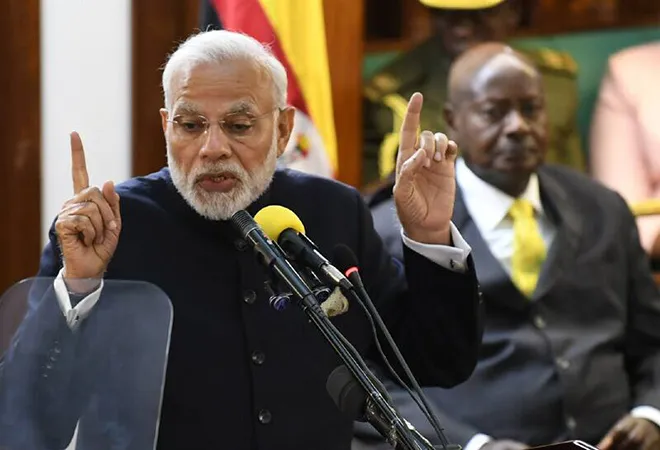-
CENTRES
Progammes & Centres
Location
Taking into account their shared history of cooperating over decolonisation, India and North African nations have much potential to develop deeper relations

Despite varied resources on Indian foreign policy in the Middle East and North Africa region, there remain significant gaps in our understanding of India-North Africa ties. This article explores the relationship using material from Indian foreign policy archives as well as statements from the Indian Ministry of External Affairs apart from news articles.
In the modern day, India’s relations with the North African nations was seen in India supporting democratic reforms and decolonisation, a product of Jawaharlal Nehru’s foreign policy impetus. India’s partnership with Egypt to form the Non-Aligned Movement as well as the presence of the rest of the four North African nations in the movement is proof of it. Moreover, India also supported the independence movements of Tunisia and Algeria, and figures like Nehru were often honoured in Libya for his vision of decolonisation. Presently, North Africa’s importance for India is rooted in several factors.
Firstly, Egypt is a power broker in the Middle East, making North Africa a lucrative target for Indian diplomacy. Egypt’s ties with Israel, Saudi Arabia, and the United Arab Emirates (UAE) make it an important ally in the Middle East region, where India has been expanding its footprint. Secondly, nations such as Morocco and Algeria become geographical gateways to other parts of Africa. This is especially relevant for India given its desire to penetrate Francophone Africa, a goal that Morocco has largely positioned itself to fulfil. Lastly, North African nations are also important for Europe which provides many opportunities for India to collaborate with the European Union (EU) on issues such as terrorism, migration, and climate change amongst others.
India’s goals in North Africa come under the umbrella guidance of PM Modi’s speech given to the Ugandan Parliament in 2018, whereby he mentioned that India would look to generate employment, develop the youth, advance agricultural technology, and combat issues such as climate change and terrorism, amongst others
Accordingly, India’s goals in North Africa come under the umbrella guidance of PM Modi’s speech given to the Ugandan Parliament in 2018, whereby he mentioned that India would look to generate employment, develop the youth, advance agricultural technology, and combat issues such as climate change and terrorism, amongst others. Specifically with the North African nations, India also aims to garner support for its bid to gain a permanent seat at the United Nations Security Council.
India’s exchanges in the region can be characterised into four broad categories. The first is the economic aspect. Many of the North African nations are trade partners of India with commodities such as petroleum, machinery, electrical appliances, medical goods, and many others often being exported and imported between the nations. Of these is phosphate, which is used for agricultural purposes to enrich soil is a key import from the region. Indeed, Algeria, Tunisia, and Morocco account for almost 50 percent of India’s total imports of phosphates resulting in trade deficits occurring in some of the bilateral exchanges. All in all, as of 2019 figures (compiled from various sources), India’s trade with the region amounts to almost US $18 billion. This is sizeable but not as big as India’s engagement with other nations like the UAE (US $60 billion).
The second aspect is defence and counter terrorism. India’s defence relations with nations in North Africa are staggered with Egypt snatching up the lion’s share of bilateral defence exchanges, given their history of conducting joint military trainings and India producing military vehicles for Egypt. India also upgraded its relationship with Algeria in 2021 having conducted its maiden maritime partnership off the Algerian coast in the Mediterranean—a sign of India’s growing interest in growing its maritime prowess as well. Over the last decade, India has also ramped up its counterterrorism partnerships with Egypt and Morocco as well, given how all three nations engage with terrorist actors. Not many engagements have been seen with the other nations though.
Third, India has long boosted its image in the North African nations by providing medical, financial, and agricultural aid such as when it donated more than 1 million dollars to Libya to help stabilise the nation after the fall of Gaddafi in 2010. India’s vaccine Maitri programme meant to distribute vaccines for COVID-19 also included some North African nations. Indian workers in nations like Libya are also well regarded due to their role as skilled medical professionals. In addition, India has also provided various educational scholarships to citizens of the North African nations who often come to India to take advantage of the affordable living costs amongst other things.
Finally, many of the North African nations also have a long love affair with Bollywood, making it one of India’s most powerful soft power export apart from aid for the region. Thus, nations like Algeria have even made documentaries on Bollywood due to the wide penetration of Hindi movies in the nation. Nations like Egypt and Morocco are also home to large fan followings of actors like Shah Rukh Khan and Aishwarya Rai amongst others demonstrating the deep seated love for Indian entertainment.
Many of the North African nations also have a long love affair with Bollywood, making it one of India’s most powerful soft power export apart from aid for the region. Thus, nations like Algeria have even made documentaries on Bollywood due to the wide penetration of Hindi movies in the nation
As such, it is clear that India has cultivated a long relationship with the North African nations and continues to nurture various partnerships albeit at a slow pace.
Going forward, India should focus on increasing co-operation with the North African nations on issues that are going to affect both itself and the five nations. For instance, despite Indian tourists globally amounting to 27 million in the year 2019, not much information was present regarding Indians travelling to Tunisia and Algeria. Egypt and Morocco saw about 1,25,000 and 20,000 Indian tourists each, in 2018 and 2017 respectively, while Libya likely wouldn’t have any due to the ongoing conflict situation. Collectively then, less than 0.5 percent of Indian tourists travelled to the North African nations, which creates much potential for further influx of Indian tourists once the pandemic subsides.
Another issue that North Africa and India will jointly face is that of climate change. All the nations present will witness decreasing agricultural produce, water scarcity, migration from coastal to inner regions and rising temperatures, all of which will affect economic activity and wealth creation adversely. It is imperative, therefore, that India co-operates with its North African partners to develop and make available cleaner technology at better rates, while also shoring up efforts to recycle and reduce excessive usage of resources.
Moreover, other prospective areas for co-operation is in the issue of counterterrorism. India has largely managed to avoid the spectre of terrorism with no major terrorist attack since 2014 outside of Kashmir, which is dealing with an active insurgency. Lessons learnt from India can be applied in these nations once the geographic and demographic differences are accounted for. The reverse is also true with Morocco, which has managed to suppress terrorist activities quite successfully serving as an inspiration for India and its counterterrorism/counterextremism operations.
Last, to boost business engagement with the five nations, both groups should also consider increasing connectivity via flight gradually. Preliminary searches of flights between different parts of India and the different nations reveal that no direct flights to all five nations are operational and those with stopovers are either quite long—over 20 hours travel time—or quite costly—over US $1,000 for one-way flights. While this is likely due to a lack of demand, any increase in bilateral trade needs to be complemented by increasing travel connectivity too to encourage businessmen from both regions to visit the other more frequently, and consequently produce more business.
India’s engagement with the North African nations are historic, but still not as immense as other nations such as UAE and Saudi Arabia. There exists immense potential for India to ramp up its presence in North Africa pertaining to trade, defence, and counterterrorism amongst others. Moreover, India could also play a significant role in generating more employment, increasing tourism and combating climate change in the region, ventures that would also benefit India significantly. In the long run, this region will become an important gateway to India’s global power ambitions and its presence in Africa, and it would do well to increase its activities here.
The views expressed above belong to the author(s). ORF research and analyses now available on Telegram! Click here to access our curated content — blogs, longforms and interviews.

Dr. Mohammed Sinan Siyech is a Non – Resident Associate Fellow working with Professor Harsh Pant in the Strategic Studies Programme. He works on Conflict ...
Read More +